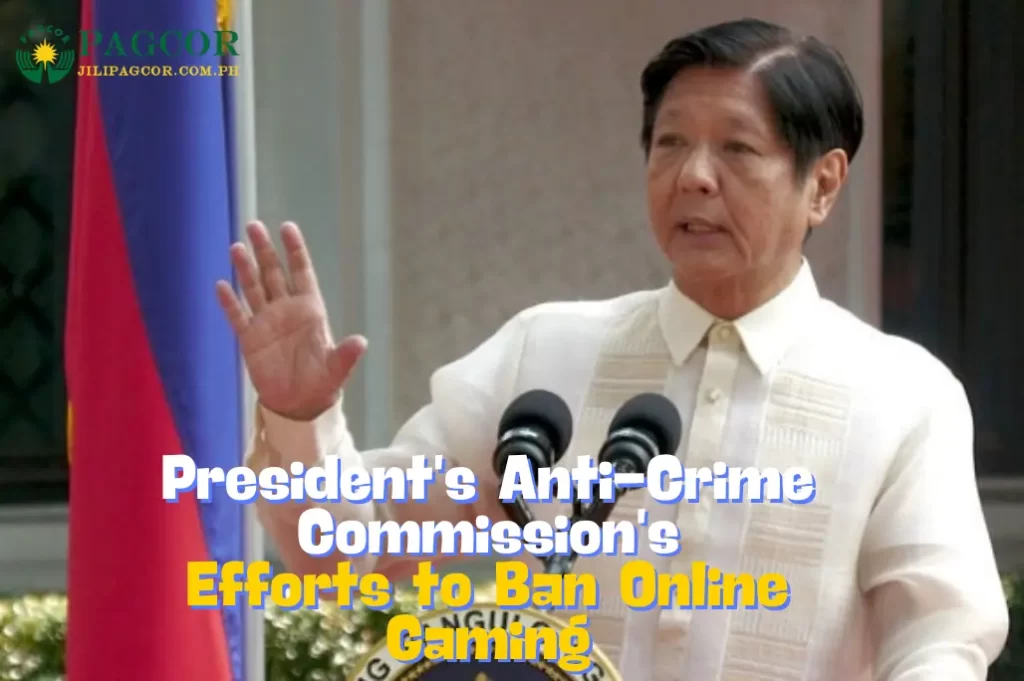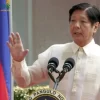President Ferdinand Marcos Jr. has announced a complete ban on online gaming companies operating in the country. Sending shockwaves through the Philippine gaming industry. This decisive action was supported by the President’s Anti-Crime Commission and endorsed by the Department of Justice. Marks a turning point in the Philippines’ approach to regulating the controversial offshore gaming sector. The ban comes in response to mounting pressure from officials, lawmakers, and the public. Who have raised concerns about the numerous crimes associated with online gaming operations? As the government prepares to implement this sweeping prohibition, questions arise about its impact on the industry, the economy, and the thousands of workers employed in this sector. We continuously update information on Gambling news on Jilipagcor.
President’s Anti-Crime Commission’s Efforts to Ban Online Gaming
The President’s Anti-Crime Commission (PACC) has taken centre stage in the government’s efforts to implement the ban on online gaming in the Philippines. This section explores the commission’s approach, challenges, and expectations as it works to fulfil President Marcos’ directive.

Presidential Directive and Timeline
President Ferdinand Marcos Jr.’s announcement during his third State of the Nation Address on July 22 sent a clear message: all online gaming companies must cease operations by the end of the year. This five to six-month timeframe has been deemed sufficient by Winston Ginez, spokesperson for the Presidential Anti-Organized Crime Commission (PAOCC). Ginez expressed confidence in the government’s ability to execute the ban within the given period, provided all relevant agencies work in unison.
The PAOCC’s strategy involves a systematic approach to shutting down online gaming companies. Working in collaboration with the Philippine National Police (PNP) and the National Bureau of Investigation (NBI), the commission aims to close one online gaming company every two weeks. This systematic process creates a ripple effect throughout the industry, encouraging compliance and voluntary exits.
Expected Impact on Online Gaming Companies
The PAOCC anticipates that the President’s directive will significantly impact the online gaming landscape in the Philippines. Ginez has expressed optimism that many companies will leave the country voluntarily rather than face forced closure or legal consequences. This expectation is based on the assumption that the government’s firm stance and consistent enforcement actions will create a “chilling effect” on the remaining operators.
However, the commission is aware of the challenges that lie ahead. Ginez acknowledges that some online gaming companies may refuse to comply with the ban and instead opt to go underground. This scenario presents a considerable challenge for law enforcement agencies, as covert operations are often more difficult to detect and shut down.
Challenges in Implementation
Completely eradicating online gaming operations in the Philippines is fraught with challenges. One of the primary concerns is the prospect for companies to relocate their operations to less regulated jurisdictions while maintaining a covert presence in the country. This could lead to a cat-and-mouse game between law enforcement and underground operators.
Another challenge lies in the technological aspect of online gaming. As operations move increasingly into the digital realm, tracking and shutting down virtual platforms becomes more complex. The PACC must develop sophisticated methods to identify and block online gaming sites, which may require collaboration with internet service providers and international cybersecurity experts.
Furthermore, the commission must navigate the delicate balance between enforcing the ban and minimising economic disruption. The sudden closure of numerous companies could lead to job losses and decreased government revenue from licensing fees and taxes. Addressing these economic repercussions will be crucial to successfully implementing the ban.
Cooperation with Other Government Agencies
The success of the online gaming ban heavily relies on inter-agency cooperation. The PACC’s collaboration with the PNP and NBI is just the beginning. To effectively implement the President’s directive, the commission must work closely with other government bodies such as the Bureau of Immigration, the Department of Labor and Employment, and the Department of Information and Communications Technology.
This multi-agency approach will be essential in addressing the various aspects of the ban, from identifying and closing physical gaming hubs to blocking online platforms and addressing the needs of displaced workers. Coordination between these agencies will ensure a comprehensive and effective ban implementation.
Monitoring and Enforcement Strategies
As the PACC moves forward with its plan to shut down online gaming companies, it must develop robust monitoring and enforcement strategies. This may include regular inspections of known gaming hubs, surveillance of suspected underground operations, and the use of advanced technology to track online gaming activities.
The commission may also consider implementing a reward system for information leading to the discovery of illegal gaming operations. This approach could encourage public participation in enforcement efforts and help uncover hidden activities that might go undetected.
In conclusion, the President’s Anti-Crime Commission faces a complex and challenging task in implementing the ban on online gaming in the Philippines. While the commission expresses confidence in its ability to meet the President’s timeline, the road ahead will likely be fraught with obstacles. The victory of this initiative will depend on the PACC’s ability to adapt to evolving challenges, maintain inter-agency solid cooperation, and balance enforcement with economic considerations.
Department of Justice’s Support for the Ban
The Department of Justice (DOJ) has emerged as a critical supporter of President Marcos’ decision to ban online gaming in the Philippines. This section examines the DOJ’s stance, its role in enforcing the ban, and the implications for the broader legal landscape.
Justice Secretary’s Endorsement Ban Online Gaming
Justice Secretary Jesus Crispin Remulla has publicly endorsed President Marcos’ decision to prohibit the Philippine offshore gaming industry. Remulla’s support lends significant weight to the ban, demonstrating a unified front between the executive branch and the justice system. The Justice Secretary’s endorsement emphasises the government’s dedication to upholding the rule of law and protecting vulnerable members of society.
Remulla has stated that the President’s order reflects the government’s determination to enforce the law effectively and fairly. This stance underscores the DOJ’s role in ensuring that the ban is implemented in a manner that is consistent with legal principles and respects due process.
Legal Framework and Enforcement Ban Online Gaming
The DOJ’s support for the ban necessitates a review and potential overhaul of the existing legal framework governing online gaming in the Philippines. This process may involve drafting new legislation and amending current laws. Or issuing executive orders to provide a solid legal basis for the prohibition.
The department will likely play a crucial role in interpreting the ban’s scope and providing guidelines for its enforcement. This may include defining what constitutes “online gaming” under the new regulations and establishing criteria for identifying companies that fall within the purview of the ban.
Furthermore, the DOJ will be instrumental in prosecuting cases against companies or individuals who violate the ban. This could involve coordinating with law enforcement agencies to gather evidence. Preparing court cases and representing the government in legal proceedings against non-compliant operators.
Addressing Human Rights Concerns Ban Online Gaming
One of the critical aspects of the DOJ’s involvement in the online gaming ban is addressing the human rights concerns associated with the industry. Recent police raids on online gaming centres have uncovered instances of investment scams, torture, and human trafficking. The department’s support for the ban is partly motivated by the need to combat these serious crimes and protect vulnerable individuals.
The DOJ must work closely with other agencies to ensure workers’ rights. Particularly those of foreign nationals will be protected during the ban’s implementation. This includes overseeing the rescue and repatriation of individuals found working without proper documentation or under exploitative conditions.
Alternative Livelihoods for Displaced Workers
A crucial component of the DOJ’s support for the ban is its emphasis on providing alternative livelihoods for workers. Who may be displaced due to the prohibition? Secretary Remulla has highlighted that the announcement of the ban includes provisions for the Department of Labor and Employment to find new employment opportunities for affected workers.

















